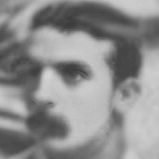John Inglis

There were two contemporary John Inglis, not to be confused. One was born and stayed in Kilmarnock. He was the older by two years, a goalkeeper, the father of football there, who won a single cap. And there is this one, who in 1883 as an inside-forward twice played for his country.
In fact he was born John Logan, in Ayrshire still but Kilwinning, in 1859, the illegitimate son of a 19 year old local girl. He then seems to have been raised initially by grand-parents, then institutionalised before making his way to Glasgow, to work to start with as a Ships Carpenter then Mechanic.
And it was in the city that he became involved with football with in 1879 a season with Partick not Partick Thistle, part of its team also to play friendlies in Lancashire. That was before he joined Rangers for four campaigns, in 1883 representing his country against both England and Wales. But he still clearly kept up his contact Down South. In 1884, with the Gers knocked out of the Scottish Cup he then turned out for Blackburn Rovers in the FA Cup quarter-final.
It was to prompt his Scottish club to cancel his membership and for Notts County, the opponents that day, to lodge a complaint with the FA about professionalism. It was somehow not upheld and he remained in the Blackburn team that in March 1884 would, in defeating Scotland's own Queen's Park, take the Cup, then return to Scotland to work the summer off-field but in footballing terms be a free-agent. It would enable him the following winter, aged twenty-five, to travel South once more for what was to be three seasons at the obviously already professional Bolton's Great Lever. By then he had already been married for two years. In 1882 in Anderston he had wed Agnes McKay, he twenty, she eighteen. Indeed, whilst their second child would be born in Bolton, their first's birth had been in Glasgow.
However, by 1886 Great Lever was in trouble. Other clubs were attracting greater crowds and with the extra gate-money able to poach its players. That lead to further decline and in 1887 finally to dissolution. But Inglis would then be signed as player-reserve-coach by Preston, as the Football League was formed and the club took the double, the family moving to the town and remaining, with the rest of what would in the end be thirteen children all born there.
After football Inglis would find work in a local soap factory and remain there for the rest of his life. He would die still in harness aged just sixty-one in 1920 and be buried in Preston Cemetery. Agnes would outlive him by nineteen years, passing still in the town in 1939.
Birth Locator:
1859 - Loch, Kilwinning, Ayrshire
Residence Locations:
1861 - Loch, Kilwinning, Ayrshire
1871 - institutionalised
1881 - 18, Hyndland St., Partick, Glasgow
1891 - 20, Bentinck St., Preston
1911 - 227, Fylde Road, Preston
1920 - 15, Cheviot St., Preston, Lancashire
Death Locator:
1920 - 15, Cheviot St., Preston, Lancashire
Grave Locator:
Preston Cemetery, Preston, Lancashire
Back to The North Lancs Trail,
or the SFHG Home page